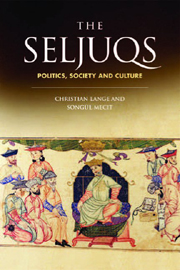Book contents
- Frontmatter
- Contents
- List of figures
- Acknowledgements
- List of abbreviations
- INTRODUCTION
- PART I POLITICS
- PART II SOCIETY
- Part III CULTURE
- 11 SHIˁI JURISPRUDENCE DURING THE SELJUQ PERIOD: REBELLION AND PUBLIC ORDER IN AN ILLEGITIMATE STATE
- 12 IN DEFENCE OF SUNNISM: AL-GHAZĀLĪ AND THE SELJUQS
- 13 ARABIC AND PERSIAN INTERTEXTUALITY IN THE SELJUQ PERIOD: ḤAMĪDĪ'S MAQĀMĀT AS A CASE STUDY
- 14 CITY BUILDING IN SELJUQ RUM
- 15 THE SELJUQ MONUMENTS OF TURKMENISTAN
- Index
11 - SHIˁI JURISPRUDENCE DURING THE SELJUQ PERIOD: REBELLION AND PUBLIC ORDER IN AN ILLEGITIMATE STATE
from Part III - CULTURE
Published online by Cambridge University Press: 12 September 2012
- Frontmatter
- Contents
- List of figures
- Acknowledgements
- List of abbreviations
- INTRODUCTION
- PART I POLITICS
- PART II SOCIETY
- Part III CULTURE
- 11 SHIˁI JURISPRUDENCE DURING THE SELJUQ PERIOD: REBELLION AND PUBLIC ORDER IN AN ILLEGITIMATE STATE
- 12 IN DEFENCE OF SUNNISM: AL-GHAZĀLĪ AND THE SELJUQS
- 13 ARABIC AND PERSIAN INTERTEXTUALITY IN THE SELJUQ PERIOD: ḤAMĪDĪ'S MAQĀMĀT AS A CASE STUDY
- 14 CITY BUILDING IN SELJUQ RUM
- 15 THE SELJUQ MONUMENTS OF TURKMENISTAN
- Index
Summary
INTRODUCTION
The Seljuqs are characterised as fanatical promoters of Sunnism in almost all the primary sources and secondary literature. Ṭughril Beg's capture of Baghdad in 447/1055 brought Buyid power, at least in the capital, to an end. With the demise of the Buyids, an environment sympathetic to Shiʿi expressions of Islam disappeared. When Ṭughril Beg quashed the almost immediate Fatimid-inspired coup attempt and recaptured the city, public expression of Shiʿism inevitably faded within the caliphal capital. The Shiʿi community, both in Baghdad and elsewhere in the Seljuq empire, faced considerable restrictions in this new context. The damage to the intellectual infrastructure of Shiʿism was also significant. Amongst the attacks on Shiʿi institutions of learning was Ṭughril Beg's reported order of the burning of libraries of scientific works, such as the Dār al-ʿIlm in al-Karkh. This had been founded by the Buyid vizier Ṣābūr b. Ardashīr (Shapur Ibn Ardeshir, d. 416/1025–6) in 381/991 (or according to another report, in 383/993), and whilst not exclusively Shiʿi in its contents or personnel, it was located in the Shiʿi quarter of Baghdad. Yāqūt (d. 626/1229) records laconically:
In [al-Karkh] there was a book treasury which the vizier Abū Nasr Ṣābūr b. Ardashīr, the vizier to Bahāʾ al-Dawla b. ʿAdu. al-Dawla had left as a bequest. There were no finer books in the world, all of them in the hands of, and recording the thoughts of, the past masters. They were burnt in a fire in the area of al-Karkh when Ṭughril Beg, the first of the Seljuq kings, entered Baghdad in 447.
- Type
- Chapter
- Information
- The SeljuqsPolitics, Society and Culture, pp. 205 - 227Publisher: Edinburgh University PressPrint publication year: 2011



